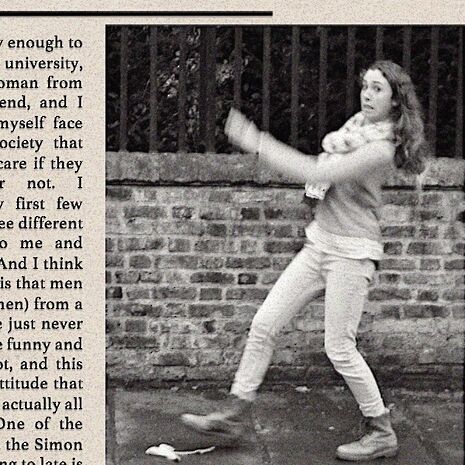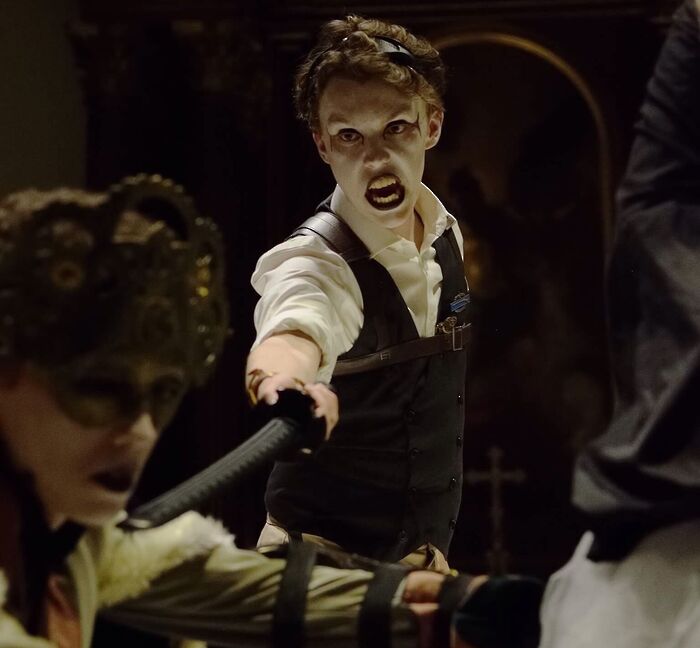Review: No Funny Business
Martha O’Neil writes that moments of No Funny Business “had the crowd in fits of laughter while simultaneously making them deeply uncomfortable”

“It’s, like, a comedy show about not being funny. It literally doesn’t make sense.” That’s how a friend described it to me. Boy, was he wrong.
No Funny Business; A Sketch Show, Corpus’s Week 7 Late Show by Sketch Club 7, promised a lot, boasting an experienced cast including Friso de Graaf, Alice Murray, Carine Valarché and Gabriel Barton-Singer, alongside a snazzy poster, a comic yet carefully-crafted teaser video, and a premise that made the whole production stand out in a world of smokers and stand-ups. I was annoyed, then, when I turned up to Corpus an hour late on the Thursday, and missed the show. By the time I eventually did manage to see the show – on the Saturday, its closing night – the sense of anticipation had been built even further. This anticipation though, was mixed with a tinge of apprehension – would I laugh? Would this be funny? I was still dealing with the aftershocks of Week 5. I really needed to laugh. I craved those endorphins. Is unfunny comedy funny? Can unfunny comedy make an audience laugh? In short; yes. Yes it can.
“A myriad of sketches that were, undoubtedly, funny”
The sketch show was modelled as a collection of works by ex-National Treasure and now-disgraced comedian Simon Hall. The audience track his inevitable fall from grace and are compelled to answer the question ‘Is Simon Hall funny?’ after he is arrested on suspicion of never having told a joke. This narrative reads much like that of the accusations being made against defamed National Treasures in recent years, with the patchwork of sketches being thread together by snippets of Hall’s arrest, evidence given by his peers and conversations between Hall and his lawyer. The show culminates in, what is billed as, ‘the comedy trial of the century’. I shall now present to you the evidence on either side of the argument.
In defence of Simon Hall: The show itself contained a myriad of sketches that were, undoubtedly, funny. The most memorable ones include de Graaf smashing an egg over his face in front of his millionaire friend, a jovial conversation between God and the Angel Gabriel about Jonah getting stuck inside a whale, and a strategy meeting between Assad and his SPADs. Such sketches allowed me to deeply embarrass myself by revealing my cackle to other members of the audience. Surely, then, this was a good indicator that Simon Hall was funny…?
Another sketch involved audience participation (to some degree, at least), with Gabriel Barton-Singer’s David Cameron grooving to a tune after resigning as Prime Minister. This was the only point in the show that made it obvious that it had been written a little while back (I, for example, had completely forgotten the conspiracies surrounding the tune Cameron whistled after his resignation speech). Yet, I still laughed. A lot. So much so that I nearly choked on my throat sweet. Ever the graceful audience member, me. So why, I hear you ask, was Hall arrested on suspicion of never having told a joke?
The case against Simon Hall: Both of the opening sketches had the crowd in fits of laughter while simultaneously making them deeply uncomfortable. Indeed, it made you doubt your own definition of ‘funny’. For example, one sketch centred around a potential terrorist apologising profusely for choosing the heavily Jewish-populated ‘Finchley’ as their target. Another was a mediation session between a bank worker and a scheming, kleptomaniac goblin. Both scenes were initially received with laughter from the audience – only to be marred by the realisation that both sketches were underpinned with irrefutable antisemitism. How could we, the audience, have laughed at this? How could Simon Hall be funny? Was he not, simply, offensive?
“Had Hall overstepped the mark? How could this be a joke?”
One of the most memorable sketches was a solo piece by Carine Valarché, whose larger-than-life character organises an aerobatic air show to celebrate the achievements of a colleague with whom she works at a New York office in 2001. Once again, the audience’s gradual realisation of the scene’s dark undercurrent of the sketch stimulates feelings of shock, even of shame, at the fact that, as an audience, we had laughed at Valarché’s character but some moments before. Can gallows humour ever be funny? Had Hall overstepped the mark? How could this be a joke?
The Verdict: This was a show that compelled its audience to consider their own moral compass and their own inner-ethical codes and was a production which – through the audience’s own laughter – directly involved them in the potential crimes being committed by Simon Hall. Were we guilty by association? Yet, in some sense, the writers missed a trick in not furthering audience participation. They could have, for example made the audience the jury, thus leaving it open to each audience to decide whether Hall was innocent or guilty. Overall, however, the show was as thought-provoking as it was witty, droll and clever. One cannot fault the stellar performances of all four on stage, whose characterisation and comic timing perfectly complemented the mirthful yet provocative script.
If this show returns to Cambridge or sets its sights on going to Edinburgh in the future, I would implore you go along - if not to laugh, then to confront your own prejudices, experience the dichotomy of dark humour and to witness an intern accidentally causing nuclear Armageddon
 News / Eight Cambridge researchers awarded €17m in ERC research grants27 December 2025
News / Eight Cambridge researchers awarded €17m in ERC research grants27 December 2025 News / Downing investigates ‘mysterious’ underground burial vault 29 December 2025
News / Downing investigates ‘mysterious’ underground burial vault 29 December 2025 Lifestyle / Ask Auntie Alice29 December 2025
Lifestyle / Ask Auntie Alice29 December 2025 Sport / Hard work, heartbreak and hope: international gymnast Maddie Marshall’s journey 29 December 2025
Sport / Hard work, heartbreak and hope: international gymnast Maddie Marshall’s journey 29 December 2025 News / News in Brief: carols, card games, and canine calamities28 December 2025
News / News in Brief: carols, card games, and canine calamities28 December 2025







